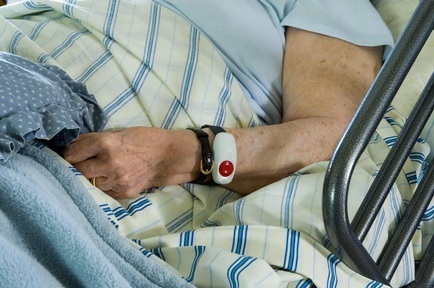Lack of dignity and failure to help older people eat 'endemic' in vast majority of hospitals
Up to one million older people are not treated with dignity and are not given help with eating in hospitals in England, according to a new study.

The statistical analysis of inpatient experience data in NHS hospitals in England found older hospital patients face a ‘widespread and systematic’ pattern of inadequate care.
The research by Dr Polly Vizard and Dr Tania Burchardt of the Centre for Analysis of Social Exclusion (CASE) at LSE found older people’s experiences of poor or inconsistent standards of dignity and help with eating were too high in the ‘vast majority’ of NHS trusts.
Caroline Abrahams, Age UK’s charity director, said: “This new in-depth analysis of older people's reported experiences shows just how big the challenge is in ensuring every older person in hospital receives the dignity they deserve and help with eating if they require it.
“It must be recognised that the data this research is based on is two years old now and that the newest figures suggest some welcome improvement, especially as regards older people's experiences of 'dignity, but this sobering report certainly shows that hospitals need to redouble their efforts.”
She added: “Above all it is really worrying, if perhaps not altogether surprising, that the more vulnerable an older person is, the greater their risk of not being treated as we would all wish for ourselves or our loved ones. Turning this situation around ought to be a top priority and no hospital can afford to be complacent.”
Dr Polly Vizard of CASE at LSE called the findings “disturbing” and said: “What really stands out is not just the large number of patients who say they aren’t always being cared for in a dignified way or helped to eat - but also that there has been remarkably little change in the percentage of individuals reporting inconsistent and poor standards of care over a substantial period time.
“An important message arising from the Francis Inquiry into the tragedy at the Mid-Staffordshire NHS Foundation Trust concerned the need to make “better use” of patient experience data in the future. Treatment with dignity and respect, and help with eating for those who need it, are key markers of quality of care. Our analysis across NHS hospitals suggests that experiences of poor or inconsistent standards of dignity and help with eating during hospital stays are endemic across the vast majority of trusts.”
The analytical study found that twenty-three per cent of people reported experiencing poor or inconsistent standards of dignity and respect and of those who did need help eating, more than one in three patients did not receive enough assistance. This is equivalent to 2.8 million people annually, of whom 1 million are aged 65 and over.
Of those who did need help eating, more than one in three patients did not receive enough assistance. This is equivalent to 1.3 million people on an annual basis, of whom 640,000 are aged 65 and over.
Amongst older people, poor or inconsistent care was more likely to be experienced by women, and those aged over 80. The risks were also higher for those with a long-standing illness or disability such as deafness of blindness.
The report calls for sustained efforts to ensure improvement in standards of dignity and support with eating for hospital patients – the majority of whom are aged 60 and over, many of whom will be frail and suffering from multiple conditions.
It also wants to see a renewed focus on implementation and enforcement of the new fundamental standards concerning dignity and meeting individual nutritional needs introduced in the wake of the Mid-Staffordshire NHS Foundation Trust Public inquiry.
Plus a new and improved approach for identifying hospitals where poor quality care is a cause for concern, for example, separate monitoring of the care provided to older disabled women.
Equality and human rights standards should be embedded into the monitoring, inspection and regulation of all health care, the report added.
Latest News
 29-Jul-24
Dementia Bus gives carehome.co.uk staff insight into life with dementia
29-Jul-24
Dementia Bus gives carehome.co.uk staff insight into life with dementia
 01-Mar-24
Find out the top care homes in 2024
01-Mar-24
Find out the top care homes in 2024
 21-Mar-23
UK's top care homes in 2023 revealed
21-Mar-23
UK's top care homes in 2023 revealed
 03-Jan-23
carehome.co.uk launches free care helpline
03-Jan-23
carehome.co.uk launches free care helpline
 13-Dec-22
5 mins with Emily Whitehurst, chief operating officer for Constantia Healthcare
13-Dec-22
5 mins with Emily Whitehurst, chief operating officer for Constantia Healthcare